英语短文-如何避免冲孩子发脾气
如何避免生气英语作文

如何避免生气英语作文In our daily lives, it's inevitable to encounter situations that can provoke anger. However, managing our emotions is crucial for maintaining a healthy mental state and fostering positive relationships. Here are some strategies to avoid getting angry:1. Practice Mindfulness: Being present in the moment can help you recognize when anger is starting to build. Mindfulness techniques such as deep breathing and meditation can help you stay calm.2. Identify Triggers: Understand what situations or behaviors typically make you angry. By identifying these triggers, you can prepare yourself to react differently when they occur.3. Communicate Assertively: Express your feelings and needs clearly and respectfully. Avoid aggressive language and focus on "I" statements to prevent the other person from becoming defensive.4. Take a Time-Out: If you feel anger rising, it's okay to step away from the situation for a few minutes. This can give you time to calm down and think rationally.5. Exercise Regularly: Physical activity is a great way to release pent-up emotions. Regular exercise can also help reduce stress and improve your mood.6. Maintain a Balanced Diet: Eating a healthy diet can have a positive impact on your mood and energy levels, making it easier to handle stress and avoid anger.7. Get Enough Sleep: Lack of sleep can make you moreirritable and less able to handle stress. Ensure you're getting the recommended 7-9 hours of sleep per night.8. Seek Professional Help: If your anger is causing problems in your life or you're finding it difficult to manage, consider seeking help from a mental health professional.9. Cultivate Empathy: Try to understand the perspective of others. This can help reduce frustration and anger.10. Practice Gratitude: Focusing on the positive aspects of your life can help shift your mindset and reduce feelings of anger.11. Learn to Forgive: Holding onto grudges can keep you trapped in a cycle of anger. Learning to forgive can be a powerful tool for emotional freedom.12. Set Boundaries: Know your limits and communicate them to others. Setting boundaries can help prevent situations that lead to anger.Remember, it's normal to feel angry from time to time, butit's how you manage that anger that matters. By incorporating these strategies into your life, you can learn to avoidgetting angry and maintain a more peaceful and positive outlook.。
控制脾气的方法英语作文
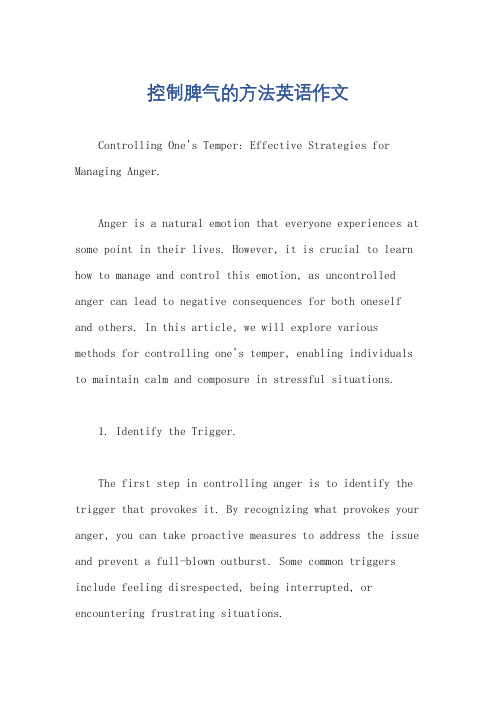
控制脾气的方法英语作文Controlling One's Temper: Effective Strategies for Managing Anger.Anger is a natural emotion that everyone experiences at some point in their lives. However, it is crucial to learn how to manage and control this emotion, as uncontrolled anger can lead to negative consequences for both oneself and others. In this article, we will explore various methods for controlling one's temper, enabling individuals to maintain calm and composure in stressful situations.1. Identify the Trigger.The first step in controlling anger is to identify the trigger that provokes it. By recognizing what provokes your anger, you can take proactive measures to address the issue and prevent a full-blown outburst. Some common triggers include feeling disrespected, being interrupted, or encountering frustrating situations.2. Take a Deep Breath.When you feel angry, it is essential to pause and takea moment to calm down. Taking deep breaths helps to slow down your heartbeat and reduces the stress hormone cortisol. This simple exercise can give you a moment to collect your thoughts and prevent you from reacting impulsively.3. Count to Ten.Counting to ten is another effective strategy for calming down when angry. This technique helps to interrupt the angry thought process and allows you to regain controlof your emotions. You can count slowly, focusing on each number and taking a deep breath with each count.4. Change Your Perspective.Reframing the situation can help you see things from a different perspective and reduce your anger. Try to viewthe situation objectively and consider the other person'sperspective. Understanding that everyone has their own challenges and stresses can help you feel more empathy and compassion, which in turn can diffuse your anger.5. Communicate Effectively.Effective communication is crucial for resolving conflicts and preventing angry outbursts. When you feel angry, try to express your feelings calmly and clearly, avoiding accusatory or inflammatory language. Use "I" statements to communicate your needs and feelings, and be willing to listen to the other person's perspective.6. Practice Forgiveness.Holding onto anger and resentment can fester and lead to further conflicts. Practicing forgiveness can help you let go of negative emotions and move forward. Forgiveness does not mean condoning the other person's behavior, but it does allow you to release the anger and focus on positive outcomes.7. Seek Support.If you find it difficult to control your anger, seeking support from a trusted friend, family member, or professional can be helpful. Talking about your feelings and strategies for managing anger can provide valuable insights and support.8. Develop a Coping Strategy.Developing a coping strategy for managing anger can help you prepare for future situations. Identify situations that trigger your anger and brainstorm ways to respond calmly and effectively. These strategies can include taking a break, engaging in physical activities, or seeking professional help.In conclusion, controlling one's temper is an essential skill for maintaining positive relationships and personal well-being. By identifying triggers, taking deep breaths, changing perspectives, communicating effectively,practicing forgiveness, seeking support, and developingcoping strategies, you can take control of your anger and manage it effectively. With practice and patience, you can turn angry outbursts into calm and constructive responses.。
How to Cope with Your Child's bad temper

How to Cope with Your Child’s Bad Temper如何有效应对孩子的坏脾气As a parent, you might have a close emotional connection with your child. You’re the only one who can feel their emotions and understand almost all behavioral hints. Every mother has an opportunity to keep an eye on their children and analyze everything they say and do. If you see that your child is in low spirits, you should be ready to take immediate measures to prevent the explosion of a crying bomb. Try to notice strange gestures and puzzled expression of a child’s face. All these signs indicate that something bad is going to happen. I’m sure that your intuition and premonitions will help you prevent emotional outbursts of your kid.作为一个家长,您可能有一个与你的孩子情感联系密切。
你是唯一一个可以感觉到他们的情感和理解几乎所有暗示行为的人。
每一个母亲都有一个机会来照看孩子和分析他们所说的和所做的的一切。
如果你看到你的孩子情绪低落时,你应该准备好立即采取措施防止哭炸弹的爆炸。
父亲教导儿子控制脾气的英语课文

Once upon a time, there was a young boy named Jack. He had a very bad temper and often lost control of his emotions. Whenever something didn't go his way, he would throw a tantrum or say hurtful things to those around him. His parents were worried about Jack's behavior and knew that they had to do something to help him control his anger.One day, Jack's father sat him down and said, "Son, I want to teach you a valuable lesson about controlling your temper. In life, there will always be situations that make us angry or upset. But it's important to remember that how we react to these situations defines who we are."Jack listened intently as his father continued, "When you feel yourself getting angry, take a deep breath and count to ten. This will give you a moment to calm down and think before you react. Remember, it's okay to be angry, but it's not okay to let that anger control you."His father then shared an inspiring story with Jack. It was a story about a wise man who was known for his calmness and self-control. The man would always respond to difficult situations with kindness and understanding, even when he was provoked. People admired him for his ability to keep his cool and never let his anger get the best of him. Jack's father explained, "Just like the wise man in the story, you too can choose how you react to situations. Instead of getting angry and lashing out, try to understand the other person's perspective. Take a moment to put yourself in their shoes and see things from their point of view. This will help you respond with empathy and kindness."From that day forward, Jack practiced his father's advice whenever he felt his temper rising. He would take a deep breath, count to ten, and try to understand the situation from the other person's perspective. Gradually, he started to notice a change in his behavior. He became more patient, understanding, and in control of his emotions.Through his father's guidance and his own efforts, Jack learned the importance of controlling his anger. He realized that by keeping his temper in check, he could maintain healthier relationships with others and avoid unnecessary conflicts.In conclusion, controlling our temper is a valuable skill that everyone should strive to develop. It helps us maintain our composure indifficult situations, promotes understanding and empathy, and fosters healthier relationships. Like Jack, we can all learn to take a deep breath, count to ten, and choose our reactions wisely. Let us remember that it is within our power to control our emotions and create a more peaceful world.。
养娃不能急躁作文
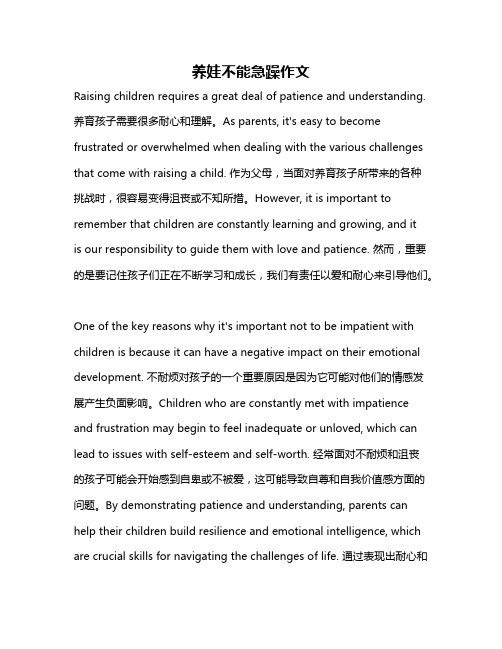
养娃不能急躁作文Raising children requires a great deal of patience and understanding. 养育孩子需要很多耐心和理解。
As parents, it's easy to become frustrated or overwhelmed when dealing with the various challenges that come with raising a child. 作为父母,当面对养育孩子所带来的各种挑战时,很容易变得沮丧或不知所措。
However, it is important to remember that children are constantly learning and growing, and itis our responsibility to guide them with love and patience. 然而,重要的是要记住孩子们正在不断学习和成长,我们有责任以爱和耐心来引导他们。
One of the key reasons why it's important not to be impatient with children is because it can have a negative impact on their emotional development. 不耐烦对孩子的一个重要原因是因为它可能对他们的情感发展产生负面影响。
Children who are constantly met with impatience and frustration may begin to feel inadequate or unloved, which can lead to issues with self-esteem and self-worth. 经常面对不耐烦和沮丧的孩子可能会开始感到自卑或不被爱,这可能导致自尊和自我价值感方面的问题。
乱发脾气解决问题英语作文
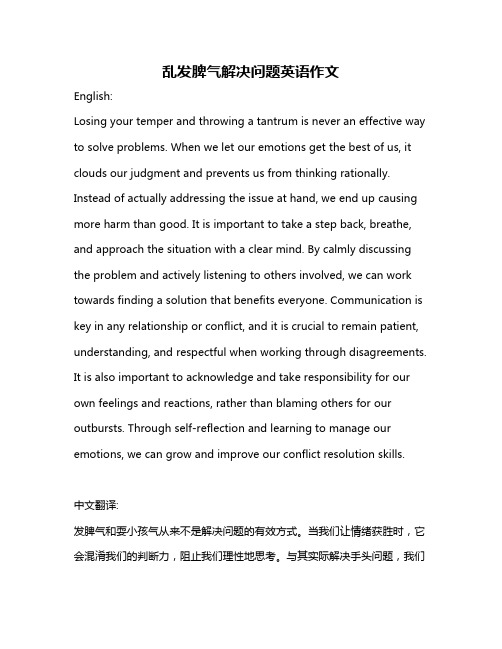
乱发脾气解决问题英语作文English:Losing your temper and throwing a tantrum is never an effective way to solve problems. When we let our emotions get the best of us, it clouds our judgment and prevents us from thinking rationally. Instead of actually addressing the issue at hand, we end up causing more harm than good. It is important to take a step back, breathe, and approach the situation with a clear mind. By calmly discussing the problem and actively listening to others involved, we can work towards finding a solution that benefits everyone. Communication is key in any relationship or conflict, and it is crucial to remain patient, understanding, and respectful when working through disagreements. It is also important to acknowledge and take responsibility for our own feelings and reactions, rather than blaming others for our outbursts. Through self-reflection and learning to manage our emotions, we can grow and improve our conflict resolution skills.中文翻译:发脾气和耍小孩气从来不是解决问题的有效方式。
解决发脾气的方法英语作文高二
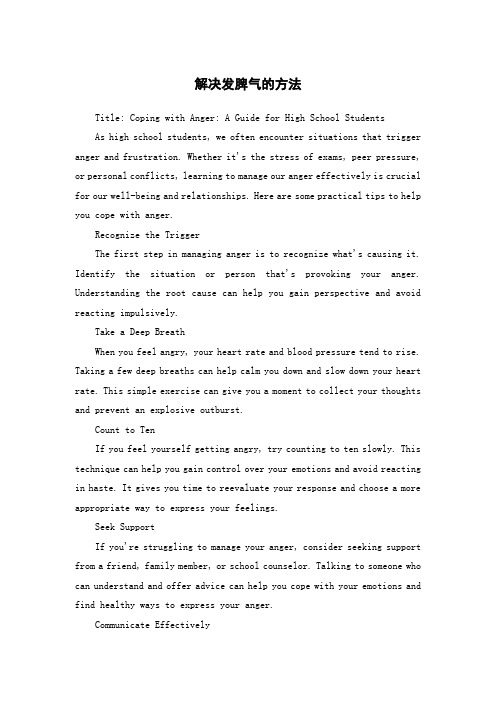
解决发脾气的方法Title: Coping with Anger: A Guide for High School StudentsAs high school students, we often encounter situations that trigger anger and frustration. Whether it's the stress of exams, peer pressure, or personal conflicts, learning to manage our anger effectively is crucial for our well-being and relationships. Here are some practical tips to help you cope with anger.Recognize the TriggerThe first step in managing anger is to recognize what's causing it. Identify the situation or person that's provoking your anger. Understanding the root cause can help you gain perspective and avoid reacting impulsively.Take a Deep BreathWhen you feel angry, your heart rate and blood pressure tend to rise. Taking a few deep breaths can help calm you down and slow down your heart rate. This simple exercise can give you a moment to collect your thoughts and prevent an explosive outburst.Count to TenIf you feel yourself getting angry, try counting to ten slowly. This technique can help you gain control over your emotions and avoid reacting in haste. It gives you time to reevaluate your response and choose a more appropriate way to express your feelings.Seek SupportIf you're struggling to manage your anger, consider seeking support from a friend, family member, or school counselor. Talking to someone who can understand and offer advice can help you cope with your emotions and find healthy ways to express your anger.Communicate EffectivelyIf you're angry about something, try to communicate your feelings in a calm and respectful manner. Expressing yourself clearly can help resolve conflicts and prevent misunderstandings. Avoid using angry or aggressive language that could escalate the situation.In conclusion, managing anger is an important skill for high school students to develop. By recognizing the trigger, taking a deep breath, counting to ten, communicating effectively, and seeking support, you can learn to cope with anger in a healthy and productive way. Remember, it's okay to feel angry, but it's important to learn how to express and manage those feelings in a positive manner.。
阻止孩子吵架英文作文
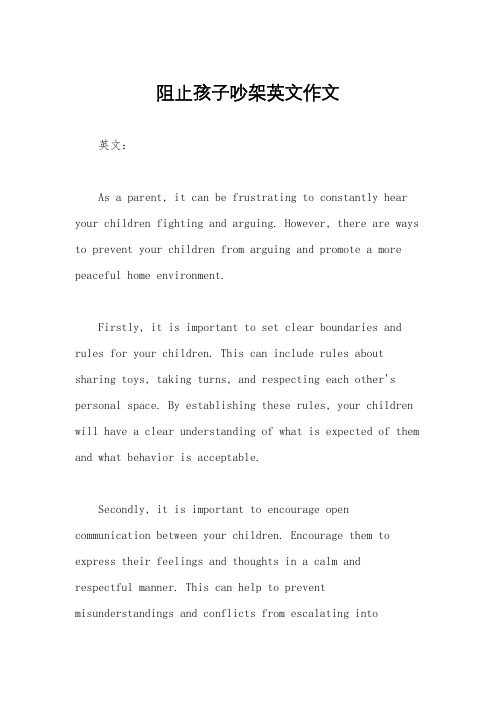
阻止孩子吵架英文作文英文:As a parent, it can be frustrating to constantly hear your children fighting and arguing. However, there are ways to prevent your children from arguing and promote a more peaceful home environment.Firstly, it is important to set clear boundaries and rules for your children. This can include rules about sharing toys, taking turns, and respecting each other's personal space. By establishing these rules, your children will have a clear understanding of what is expected of them and what behavior is acceptable.Secondly, it is important to encourage open communication between your children. Encourage them to express their feelings and thoughts in a calm andrespectful manner. This can help to prevent misunderstandings and conflicts from escalating intoarguments.Lastly, it is important to lead by example. As parents, we are the role models for our children. If we areconstantly arguing and fighting, it is likely that our children will follow suit. Therefore, it is important to model positive communication and conflict resolution skills.中文:作为父母,听到孩子们不断地争吵和争吵可能会让人沮丧。
- 1、下载文档前请自行甄别文档内容的完整性,平台不提供额外的编辑、内容补充、找答案等附加服务。
- 2、"仅部分预览"的文档,不可在线预览部分如存在完整性等问题,可反馈申请退款(可完整预览的文档不适用该条件!)。
- 3、如文档侵犯您的权益,请联系客服反馈,我们会尽快为您处理(人工客服工作时间:9:00-18:30)。
英语短文如何避免冲孩子发脾气Nearly every parent loses control and screams at the children now and then. But what if you do it repeatedly?几乎每一位父母都有情绪失控和对孩子高声叫嚷的时候。
但如果你频频如此呢?Researchers suspect parents are yelling more. Parents have been conditioned to avoid spanking, so they vent their anger and frustration by shouting instead. Three out of four parents yell, scream or shout at their children or teens about once a month, on average, for misbehaving or making them angry, research shows. Increasingly, therapists and parenting experts are homing in on how it hurts a child, as well as how to stop it.研究人员猜测,父母如今吼孩子比以前更频繁了。
父母已经习惯于不动手打孩子屁股,因此他们会通过大喊大叫来发泄愤怒和不满。
研究显示,四分之三的父母会因家中幼童或青少年犯错误或惹他们生气而吼叫、尖叫或大喊,平均每月一次。
治疗师和家庭教育专家正越来越多地关注这类行为会对孩子产生何种伤害以及如何阻止这类行为。
Raising your voice isn’t always bad. Loudly describing a problem can call attention to it without hurting anyone, says Adele Faber, a parenting trainer in Roslyn Heights, N.Y., and co-author of ‘How to Be the Parent You Always Wanted to Be.’ For example: ‘I just mopped the kitchen floor and now it is covered with muddy footprints.’提高嗓门并不总是坏事。
纽约州罗斯林海茨(Roslyn Heights)的育儿培训师、《怎样成为理想中的父母》(How to Be the Parent You Always Wanted to Be)一书作者之一阿黛尔・费伯(Adele Faber)称,大声描述一个问题能在不伤害任何人的情况下引起关注。
例如:“我刚刚拖过厨房地板,现在又被踩得到处是泥。
”Yelling becomes damaging when it is a personal attack, belittling or blaming a child with statements such as ‘Why can’t you ever remember?’ or, ‘You always get this wrong!’ Ms. Faber says.但费伯说,当你把吼叫作为人身攻击,用“你不能长点记性吗?”或者“你总是做错!”这种话来责备或挖苦孩子时,就会给孩子带来伤害。
Many parents lose control because they take children’s misbehavior or rebellion personally, research shows: They feel attacked or think the child’s actions reflect poorly on them. Parents who see a child’s negative emotions as unexpected, overwhelming and upsetting tend to feel more threatened and frustrated with each new outburst, says a study published earlier this month in the Journal of Family Psychology. This pattern, called ‘emotional flooding,’triggers a downward spiral in the relationship, disrupting the parent’s problem-solving ability and fueling emotional reactions, such as yelling.许多父母情绪失控是因为他们对孩子的错误或叛逆行为太较真。
研究显示,他们会感觉自己受到攻击,或者认为孩子的行为让他们颜面尽失。
《家庭心理学期刊》(Journal of Family Psychology)早些时候刊登的一项研究称,认为孩子的负面情绪出人意料、让人无所适从和令人沮丧的父母,往往会在孩子每次出现新的情绪爆发时产生更强烈的受威胁和挫败感。
这种模式被称为“情绪崩溃”,会导致亲子关系陷入下行螺旋,扰乱父母解决问题的能力并催生吼叫等情绪反应。
Teens whose parents use ‘harsh verbal discipline’such as shouting or insults are more likely to have behaviorproblems and depression symptoms, says a recent study of 976 middle-class adolescents and their parents, published online last September and led by Ming-Te Wang, an assistant professor of psychology and education at the University of Pittsburgh.近期一项对976名中产阶层青少年和他们父母的调查显示,被父母用喊叫或辱骂等方式进行“严厉语言管教”的青少年更容易有行为问题和抑郁症状。
该调查去年9月份刊登在网上,由匹兹堡大学(University of Pittsburgh)心理学和教育学助理教授王明德(音)领导。
Another study suggests yelling at children may have consequences that go beyond those of spanking. Eight-year-olds whose parents disciplined them by yelling have less satisfying relationships with romantic partners and spouses at age 23, according to a 15-year study led by Stephanie Parade, an assistant professor of psychiatry and human behavior at Brown University. ‘Parents who yell may miss out on a chance to teach children to regulate their emotions,’ she says.另一项研究暗示,对孩子吼叫带来的后果可能比打屁股更严重。
布朗大学(Brown University) 精神病学和人类行为学助理教授斯蒂芬妮・帕拉德(Stephanie Parade)领导的一项为期15年的研究显示,八岁时父母通过吼叫来管教的孩子到23岁时与恋爱伴侣和配偶之间的关系不太令人满意。
她说:“大喊大叫的父母可能会错过教孩子如何管理情绪的机会。
”Spanking also predicted less satisfying adult relationships, but the negative effects were offset when parents praised their children at other times. The negative effects of yelling weren’t erased by parental warmth, however. The negative problem-solving tactics that children learn when their parents yell may stick with them as adults, says the study, published in 2012 in Marriage & Family Review. Children also may expect others to treat them in a negative way, and unconsciously pick partners who fulfill that expectation.打屁股也与成年后伴侣关系不尽人意有关联,但父母在其他时候表扬孩子会消除打屁股带来的负面影响。
然而,吼叫带来的负面影响不会因父母的关爱而消除。
《婚姻和家庭评论》(Marriage & Family Review) 2012年刊登的这项研究称,孩子会在父母吼叫时学到负面的问题解决策略,成年后他们可能仍会坚持使用这些策略。
这些孩子可能还会期望别人以负面方式对待他们,并且无意识地选择满足他们期望的伴侣。
’Yelling is where 90% of us do the most damage,’says Julie Ann Barnhill, a speaker and author of ‘She’s Gonna Blow,’a book on parental anger that has sold 135,000 copies. Ms. Barnhill says she used to yell one to three times a week at her children when they were preschoolers. She got counseling,and learned to control her anger and discipline her kids in calmer, more positive ways, techniques she now teaches other parents in speeches and workshops.《她要发火了》(She’s Gonna Blow)一书作者、演说家朱莉・安・巴恩希尔(Julie Ann Barnhill)表示:“吼叫是90%的人犯的危害最大的错误。
